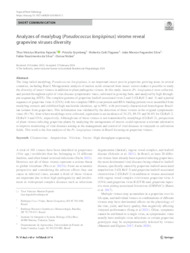Analyzes of mealybug (Pseudococcus longispinus) virome reveal grapevine viruses diversity.
Analyzes of mealybug (Pseudococcus longispinus) virome reveal grapevine viruses diversity.
Author(s): FAJARDO, T. V. M.; GRYNBERG, P.; TOGAWA, R. C.; SILVA, J. M. F.; SILVA, F. N. da; NICKEL, O.
Summary: The long-tailed mealybug, Pseudococcus longispinus, is an important insect pest in grapevine growing areas in several countries, including Brazil. Metagenomic analysis of nucleic acids extracted from insect vectors makes it possible to study the diversity of insect viruses in addition to plant pathogenic viruses. In this study, insects (Ps. longispinus) were collected, and pooled throughout a plot of virus disease symptomatic vines, cultivated in growing beds, and analyzed by high throughput sequencing (HTS). The complete genome of grapevine leafroll-associated virus 2 and 3 (GLRaV-2 and -3) and a partial sequence of grapevine virus A (GVA) with two complete ORFs (coat protein and RNA-binding protein) were assembled from mealybug extracts and exhibited high nucleotide identities, up to 99%, with previously characterized homologous Brazilian isolates from grapevines. This information was validated by the detection of these viruses in the original symptomatic vines (N=76), from where mealybugs were collected, equivalent to an incidence of 34.2%, 89.5% and 36.8% for GLRaV-2, GLRaV-3 and GVA, respectively. Although one of these viruses is not transmitted by mealybugs (GLRaV-2), prospective of plant viruses infecting grapevine plants by analyzing the metagenome of insects could represent a relevant alternative to improve monitoring of viral diseases aiming at the management and control of viral diseases in vineyards or cultivation fields. This work is the first analysis of the Ps. longispinus virome in Brazil focusing on grapevine viruses.
Publication year: 2024
Types of publication: Journal article
Unit: Embrapa Grape & Wine
Keywords: Ampelovirus, Closterovirus, High throughput sequencing, Vector, Vitivirus
Observation
Some of Embrapa's publications are published as ePub files. To read them, use or download one of the following free software options to your computer or mobile device. Android: Google Play Books; IOS: iBooks; Windows and Linux: Calibre.
Access other publications
Access the Agricultural Research Database (BDPA) to consult Embrapa's full library collection and records.
Visit Embrapa Bookstore to purchase books and other publications sold by Embrapa.

